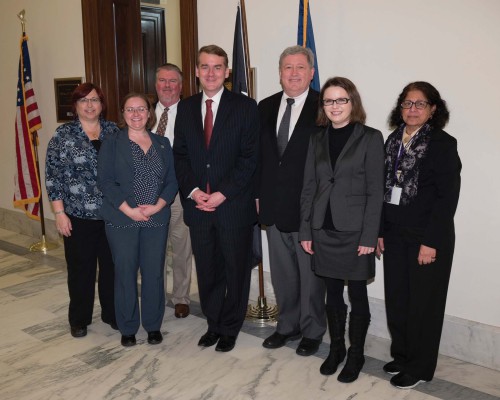Colorado Medical Society
http://dev.cms.org/articles/national-advocacy-conference/National Advocacy Conference
Tuesday, March 01, 2016 12:22 PM
Physician leaders from CMS and four component societies were on Capitol Hill in Washington, DC, Feb. 23-24, to advocate for physicians and patients. They met with both Colorado senators and many representatives or their aides. From left to right: Donna Sullivan, MD; Brandi Ring, MD; Patrick Peveto, MD; Sen. Michael Bennet; CMS President Michael Volz, MD; CMS President-elect Katie Lozano, MD; and Usha Varma, MD.
Physician leaders from CMS and the component societies of ADEMS, Denver, Mesa, Northern Colorado and Aurora-Adams were on Capitol Hill in Washington, D.C., Feb. 23-24, to advocate for physicians and patients. They focused on educating the Colorado congressional delegation on four main issues:
- Support for H.R. 4499, the Promoting Responsible Opioid Prescribing Act of 2016, and the Colorado coalition’s efforts to reduce prescription drug abuse;
- Concerns with the proposed health insurance industry mergers;
- Support for the enactment of meaningful electronic health record (EHR) reforms; and
- Support for S. 2484/H.R. 4442, the Connect for Health Act telemedicine legislation.
“The mantra in our state is ‘simplify, standardize and make clinically relevant laws and regulations to make more time for patients, less red tape and less physician burnout,’” said CMS President-elect Katie Lozano, MD. “The AMA has been really supportive.”
The Hill visits were part of the American Medical Association’s National Advocacy Conference (NAC), which brought together more than 30 state medical associations to hear the latest on national health policy and the politics of the 2016 election cycle. This was the first trip in well over a decade that physicians did not have to lobby for a fix to Medicare’s sustainable growth rate (SGR).
The Colorado NAC delegation met with several representatives and senators from Colorado. “Though we’re bringing our own issues to the Hill,” Lozano said, “we want to thank them for the work they’ve done so far – for repealing the SGR – and to ask them what they need from us. We offer to serve as a resource because this is a partnership for the people in our state.”
Regarding the specific issues, the opioid abuse and misuse crisis has reached a national public policy level and both the administration and the federal legislative branch are now involved in developing solutions. From a political perspective, physicians could easily be put in the crosshairs of finding a solution. The Colorado NAC delegation discussed what Colorado physicians are already doing to address the issue. For example, the CMS board of directors voted to make the abuse and misuse crisis a priority in 2012, and continues to actively participate in the Colorado Consortium to Prevent Prescription Drug Abuse. CMS is also partnering with multiple organizations to provide educational modules for physicians.
The AMA recommends and CMS supports reauthorizing funding to enable the modernization of prescription drug monitoring programs (PDMPs), and encourages physicians and other prescribers to register for and use these programs. Colorado already has mandatory registration in place. The AMA also recommends increasing coverage for and access to comprehensive treatment for opioid use disorder, increasing access to overdose prevention tools such as naloxone, and de-linking survey questions on pain from reimbursement determinations under the Hospital Value-Based Purchasing program.
The second big issue is the proposed mergers of Aetna-Humana and Anthem-Cigna. They are controversial; both chambers of Congress held hearings last year. State insurance commissioners and the U.S. Department of Justice are largely the decision-makers on whether the mergers are approved, denied or modified and the insurance companies have invested tremendous resources into pushing the mergers through. CMS is taking these mergers and their potential impact on physicians and patients very seriously, and discussed concerns with elected officials.
For the third major issue, physicians presented recommendations for reforms to the Meaningful Use program: to focus on the interoperability of electronic health records and resolve technology limitations; assess all measures based on their relevance, ability to meet the needs of patients and cost benefit; and align new measures with other payment and delivery system reform incentive programs.
Finally, telehealth. Colorado has made great gains in expanding access to telehealth to allow patients and physicians across the state to benefit from remote visits. The CONNECT for Health Act advances telemedicine on the national level and accelerates the adoption of health care delivery models that promote coordinated and patient-centered care. The bill establishes a bridge to help physicians meet the goals of the Medicare Access and CHIP Reauthorization Act (MACRA) and the Merit-based Incentive Payment System (MIPS), among other provisions. The AMA supports the bill.